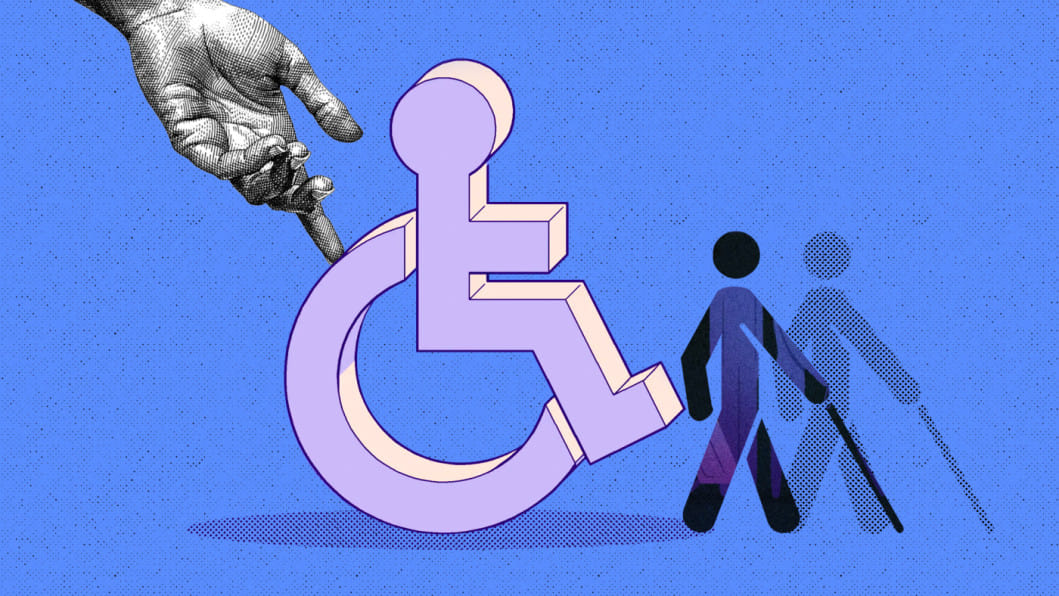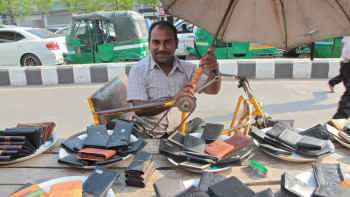Why Bangladesh must catch up with global disability commitments

The Global Disability Summit (GDS), held in April 2025 in Berlin, Germany, ended with a renewed global push to advance and protect disability rights and inclusion. At the heart of the summit was the adoption of the Amman-Berlin Declaration on Global Disability Inclusion, a powerful and unified call to action by the global community. For the first time, governments and development actors collectively committed to ensuring that at least 15 percent of international development programmes implemented at the country level explicitly target disability inclusion. This "15 percent for the 15 percent" principle—ensuring inclusive development for the estimated 15 percent of the world's population living with disabilities (WHO)—has the potential to transform lives and make the 2030 Agenda for Sustainable Development (SDGs) truly inclusive.
The declaration, endorsed by over 100 governments, development agencies, financial institutions, and multilateral organisations from both the Global North and South, sets a timeline: this 15 percent target is to be met by 2028, coinciding with the fourth Global Disability Summit. This global consensus represents more than a numerical target; it is a call for justice, equity, and practical policy shifts that can break the cycle of exclusion faced by people with disabilities worldwide.
Yet amid this global awakening, Bangladesh was noticeably absent. Bangladesh's absence from the GDS 2025 was both symbolic and troubling. A country once known as a disability rights champion in South Asia—having made eleven ambitious commitments during the previous summits in 2018 and 2022—has now retreated into silence. Historically, Bangladesh's commitments on the global stage had been inspiring, positioning the nation as a beacon for inclusive development. But the failure to participate in this critical global event reflects a stark decline in national priority on disability issues under the current interim government.
This retreat is particularly alarming given the fact that, as per the World Health Organization (WHO), over 15 percent of Bangladesh's population lives with some form of disability. These are not peripheral figures—they represent over 25 million citizens. The interim government, which took charge with the promise to eliminate discrimination and rebuild a just and more equal society, was expected to bring fresh commitment and urgency to such issues. Instead, it has allowed disability rights to fall into neglect. In the last nine months, not a single meaningful policy or initiative has been introduced to address the needs and rights of people with disabilities.
Even with the existence of the Rights and Protection of Persons with Disabilities Act, 2013, which explicitly guarantees equal rights and protection for persons with disabilities, the government continues to treat disability through a charity lens. Institutional structures meant to implement the law have been paralysed—no meetings of the National Coordination Committee or the National Executive Committee have taken place in the past nine months. This policy inertia has led to a tangible worsening of conditions: people with disabilities now face increased barriers in accessing education, health services, livelihoods, and employment. The interim government's failure to act is not just a policy lapse; it is a breach of its own legal obligations and a betrayal of millions of citizens living with disabilities.
The Amman-Berlin Declaration should serve as a roadmap for Bangladesh to realign with global disability rights standards. It reflects a collective recognition that inclusive development is not an afterthought—it is imperative. Bangladesh's silence and its failure to endorse the declaration signal a concerning lack of commitment at a time when global partnerships and shared accountability are more important than ever. It is essential that Bangladesh immediately endorses the Amman-Berlin Declaration and commits to the 15 percent for the 15 percent target. Such an endorsement must not remain symbolic. It should be accompanied by concrete actions to integrate disability inclusion into the fabric of all development efforts.
The 15 percent for the 15 percent concept is both simple and powerful. It demands that 15 percent of all development programmes—particularly those supported by international cooperation—directly address the needs of people with disabilities, who themselves comprise around 15 percent of the world's population (WHO). This model is rooted in fairness and equity. It aligns with the Sustainable Development Goals (SDGs) and the principle of "leaving no one behind," especially in countries like Bangladesh where socio-economic exclusion is disproportionately high amongst persons with disabilities.
Adopting this principle would mean rethinking policies, budgets, and programme designs to ensure real impact. It would mean shifting from tokenism to transformative inclusion. The upcoming national budget provides an immediate opportunity to put this principle into action. While thematic budgets like the gender budget and child budget have become institutionalised practices, there is still no such thematic budget for the disability sector. This gap must be addressed now. A ministry-wise disability budget should be introduced to monitor and ensure each ministry's contribution to improving the lives of persons with disabilities—be it in health, education, social welfare, employment, or infrastructure. A disability-inclusive budget is not only a matter of resource allocation but a critical instrument of accountability and visibility. Without budgetary commitment, policy promises remain hollow.
Bangladesh stands at a crossroads. Concrete actions are a must to reclaim its position as a regional leader in disability rights; otherwise, the country will continue down a path of indifference and neglect towards disability inclusion. The Global Disability Summit 2025 was not just another diplomatic gathering. It was a clarion call to rethink inclusion, refocus on rights, and reimagine development. Bangladesh's absence was a missed opportunity; but the door is not yet closed.
Ayon Debnath is a development practitioner currently working with Sightsavers as campaign adviser.
Rejaul Karim Siddiquee is a disability rights activist and advocate at Bangladesh Supreme Court, who attended the GDS 2025 in Berlin.
Views expressed in this article are the author's own.
Follow The Daily Star Opinion on Facebook for the latest opinions, commentaries and analyses by experts and professionals. To contribute your article or letter to The Daily Star Opinion, see our guidelines for submission.


 For all latest news, follow The Daily Star's Google News channel.
For all latest news, follow The Daily Star's Google News channel. 




Comments